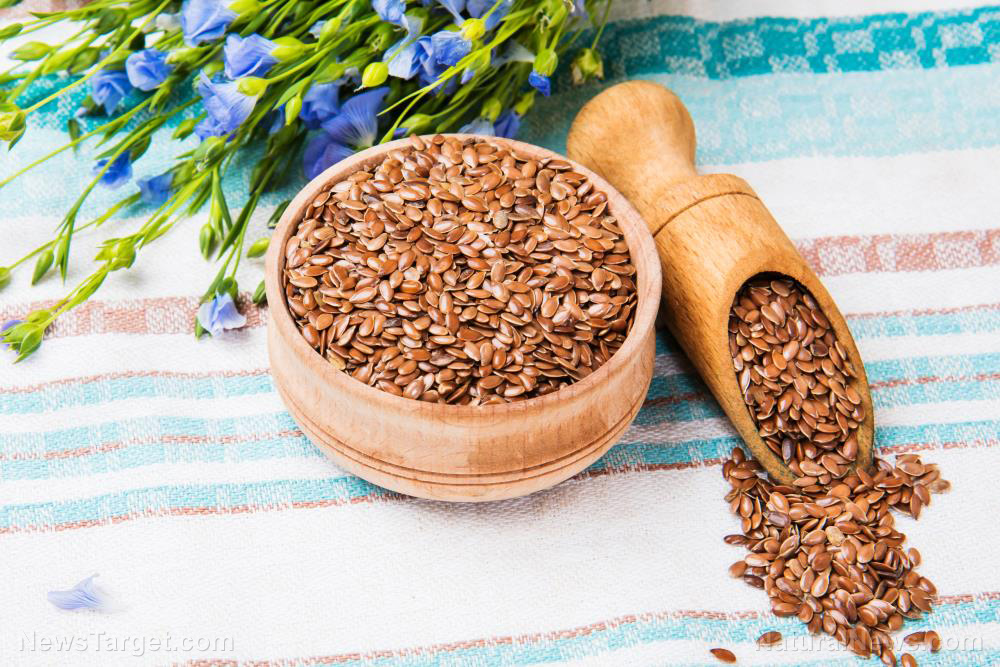Flaxseeds: Health benefits of one of the original superfoods
08/26/2019 / By Zoey Sky

Flaxseeds are popular superfoods because they promote weight loss. According to several studies, flaxseeds have other health benefits: They are good for digestive health and help lower the risk of developing cardiovascular disease.
Flaxseeds (Linum usitatissimum) are also called common flax or linseeds. There are two varieties of flaxseeds: brown or yellow. The seeds can be bought whole, ground (milled), roasted, or processed into flaxseed oil.
A tablespoon (10 grams) of whole flaxseeds contains 55 calories.
Carbohydrates and fiber
Flaxseeds contain 29 percent carbs, 95 percent of which is fiber. This means flaxseeds are low in net digestible carbs and are good for digestive health.
Two tablespoons of flaxseeds contain at least six grams of fiber, which is about 15 to 25 percent of the Reference Daily Intake (RDI) for men and women, respectively.
About 20 to 40 percent of the fiber in flaxseeds is soluble fiber (mucilage gums) while 60 to 80 percent is insoluble fiber (cellulose and lignin).
Soluble fiber helps regulate blood sugar and cholesterol levels. Additionally, soluble fiber boosts digestive health by feeding “good” gut bacteria.
Lignans
Flaxseeds are one of the best dietary sources of lignans, which are nutrients that function as phytoestrogens. Flaxseeds contain at least 800 times more lignans than any other food.
Phytoestrogens are structurally similar to estrogen, the female sex hormone. These plant compounds have weak estrogenic and antioxidant properties. Because they can reduce fat and glucose levels in the blood, phytoestrogens are associated with a lower risk of heart disease and metabolic syndrome.
Flaxseed lignans can also lower blood pressure, oxidative stress, and inflammation in the arteries.
Lignans are fermented by bacteria in the digestive system and help reduce the growth of several cancers, particularly hormone-sensitive types like breast, prostate, and uterus cancer.
Protein
Flaxseeds are 18 percent protein and have an amino acid profile similar to soybeans.
However, while flaxseeds contain essential amino acids, they lack the amino acid lysine. This makes flaxseeds an incomplete protein.
Flaxseeds are rich in arginine and glutamine. Both amino acids are essential for cardiovascular and immune system health.
The health benefits of flaxseeds
Here are more reasons to add flaxseeds to your diet.
Flaxseeds improve digestive health.
Many studies have confirmed that flaxseeds prevent both constipation and diarrhea, two conditions that cause pain and discomfort. The insoluble fiber in flaxseeds adds bulk to your waste, conferring a laxative effect that relieves constipation.
Flaxseeds lower blood cholesterol.
High blood cholesterol, particularly oxidized low-density lipoprotein (LDL) cholesterol, is a major risk factor for heart disease.
Data from human studies suggest that consuming flaxseeds or flaxseed oil daily lowers cholesterol by six to 11 percent. Flaxseeds also reduce “bad” LDL cholesterol by about nine to 18 percent. (Related: Flaxseed is one of the world’s most important medicinal foods.)
Flaxseeds lower blood pressure.
Consuming flaxseeds regularly is an effective way of lowering blood pressure.
In a study published in the journal Hypertension, participants with elevated blood pressure who consumed three tablespoons (30 grams) of flaxseeds daily reported 10 and seven mm Hg reduction in systolic and diastolic blood pressure, respectively.
It is believed that for every five mm Hg reduction in systolic and two to five mm Hg reduction in diastolic blood pressure, stroke risk is reduced by about 11 to 13 percent. Cardiovascular disease risk is also reduced by at least 34 percent.
Flaxseeds promote weight loss.
According to a review published in the journal Obesity Reviews, flaxseeds promote weight loss in overweight and obese people. Participants in controlled trials who added flaxseeds to their diet lost an average of 2.2 pounds (one kilogram). Weight loss was also greater in studies that lasted more than 12 weeks and among participants who consumed more than 30 grams of flaxseeds per day.
Considerations before adding flaxseeds to your diet
If you lack fiber in your diet, consuming a lot of flaxseeds immediately can cause mild digestive problems such as abdominal pain, bloating, gas, and nausea.
To avoid these problems, start with small doses and work your way up to one to two tablespoons (10 to 20 grams) daily. Take note that adding flaxseeds to your diet can increase bowel movement frequency.
Due to their phytoestrogen content, consumption of flaxseeds may cause undesirable effects on pregnant women and their children. Animal studies suggest that flaxseeds and flaxseed lignans can decrease birth weight and affect reproductive system development, especially if the seeds are consumed during early pregnancy.
While it’s unlikely that smaller doses of flaxseeds can have negative side effects, it is best for pregnant or breastfeeding women to limit their intake of flaxseeds and other dietary sources of phytoestrogens.
For people with bleeding disorders or taking blood thinners or other medications, consult a physician before you add large amounts of flaxseeds to your diet. Large doses of omega-3 fatty acids, which flaxseeds have in high amounts, can have blood-thinning effects.
How to add flaxseeds to your diet
To get the full benefits of flaxseeds, consume ground flaxseeds, which are easier to digest.
You can also incorporate flaxseeds into your diet by:
- Using flaxseed oil as salad dressing
- Adding the seeds to yogurt or oatmeal
- Adding flaxseeds to bread, cookie, or muffin batter
- Making flaxseed smoothies
- Using the seeds as an egg substitute
Consume flaxseeds to improve your digestive health and lower your risk of heart disease.
Sources include:
Submit a correction >>
Tagged Under:
This article may contain statements that reflect the opinion of the author
RECENT NEWS & ARTICLES
COPYRIGHT © 2017 SUPER FOODS NEWS





















